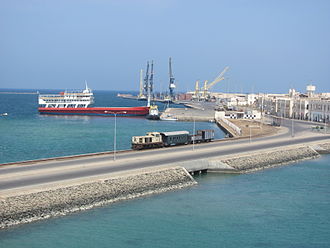Massawa travel guide in Northern Red Sea, Eritrea
Sorry, no records were found. Please adjust your search criteria and try again.
Sorry, unable to load the Maps API.
Quick Facts:
Massawa or Mitsiwa is a port city in the Northern Red Sea region of Eritrea, located on the Red Sea at the northern end of the Gulf of Zula beside the Dahlak Archipelago. It has been a historically important port for many centuries. Massawa has been ruled or occupied by a succession of polities during its history, including the Dahlak Sultanate, the Ottoman Empire, the Khedive of Egypt and the Kingdom of Italy.
| Population: | 39,758 (as of 2006) |
| State/Province: | Northern Red Sea |
| Country: | Eritrea |
| Elevation: | 6.0 m |
| Area: | 477.0 km² |

Complete Travel Guide to Massawa, Eritrea
Historical Heritage of Massawa
It was drawn by D João de Castro in 1541 in his “Roteiro do Mar Roxo” in their route to attack El Tor and Suez The captain of the Arkiko was the Portuguese Gonçalo Ferreira, second port on the coast that guaranteed the presence and maintenance of the Portuguese fleets, whenever the port of Massawa was threatened by the Turkish presence.
In 1541 the Adalites ambushed the Portuguese at the Bat.
The historical trajectory of Massawa demonstrates the complex interplay between local agency and external influences that has characterized regional development throughout successive historical periods. Understanding this historical context provides essential background for appreciating the depth and authenticity of contemporary cultural expressions.
Historical preservation efforts in Massawa reflect community commitment to maintaining connections with ancestral heritage while adapting to contemporary circumstances. These preservation activities create opportunities for visitors to experience authentic historical environments and traditional practices.
The legacy of historical development in Massawa remains visible in architectural styles, urban planning patterns, cultural traditions, and social organizations that provide continuity between past and present while supporting future community development.
Geographic Environment and Natural Setting
The topographic characteristics of Massawa result from complex geological processes that have created distinctive landscape features supporting diverse ecosystems and human activities. These natural features provide both opportunities and constraints that have influenced settlement patterns and economic development throughout history.
Hydrological systems in the Massawa region play crucial roles in supporting natural ecosystems and human communities through provision of water resources, transportation routes, and agricultural irrigation. Understanding these water systems helps explain historical settlement patterns and contemporary development opportunities.
Soil composition and agricultural potential in the Massawa area reflect the interaction of geological substrate, climatic conditions, and human management practices that have created productive agricultural systems supporting local food security and economic development.
Natural resource availability in Massawa has historically influenced economic activities and settlement patterns while continuing to provide opportunities for sustainable development that balances economic needs with environmental conservation.
The relationship between geographic features and human settlement in Massawa demonstrates sophisticated adaptation strategies that maximize advantages while minimizing risks associated with natural hazards and environmental constraints.
Seasonal variations in the geographic character of Massawa create changing opportunities for agricultural production, outdoor recreation, and transportation that influence the rhythm of community life and economic activities throughout the year.
Climate Patterns and Environmental Conditions
Climate Massawa has a hot desert climate (Köppen climate classification _BWh_). The city receives a very low average annual rainfall amount totalling around 185 millimetres (7. 28 in) and consistently experiences soaringly high temperatures during both day and night. Temperature patterns in Massawa influence agricultural cycles, tourism seasons, and daily life rhythms throughout the year. The annual mean average temperature approaches 30 °C (86 °F), which is one of the highest found in the world. Temperature patterns in Massawa influence agricultural cycles, tourism seasons, and daily life rhythms throughout the year. Massawa is noted for its very high summer humidity despite being a desert city. This combination of the desert heat and high humidity makes the apparent temperatures seem even more extreme. Temperature patterns in Massawa influence agricultural cycles, tourism seasons, and daily life rhythms throughout the year. The sky is usually clear and bright throughout the year. Climate data for Massawa (1961 to 1990) Month Jan Feb Mar Apr May Jun Jul Aug Sep Oct Nov Dec Year Mean daily maximum °C (°F) 29. 0) Daily mean °C (°F) 24. 2) Mean daily minimum °C (°F) 19. 0) Average rainfall mm (inches) 34. 23) Average rainy days (≥ 1. 1 Average relative humidity (%) 76. 1 Source: NOAA 1. “Massawa Climate Normals 1961–1990”. National Oceanic and Atmospheric Administration. Archived from the original on 19 February 2021. Retrieved 24 June 2015.
The climatic regime of Massawa reflects the complex interaction of geographic location, topographic features, and regional weather patterns that create distinctive seasonal characteristics influencing both natural ecosystems and human activities throughout the year.
Temperature variations in Massawa create distinct seasonal periods that influence agricultural cycles, energy consumption patterns, and outdoor activity opportunities while requiring adaptive strategies for housing, clothing, and food preservation.
Precipitation patterns in Massawa determine water availability for agricultural production, urban consumption, and natural ecosystem maintenance while influencing the timing of traditional festivals and seasonal economic activities.
Seasonal weather patterns in Massawa create varying opportunities for different types of economic activities, recreational pursuits, and cultural celebrations that contribute to the distinctive rhythm of community life throughout the year.
The interaction between climate and human adaptation in Massawa demonstrates sophisticated traditional knowledge systems for managing seasonal variations while taking advantage of favorable conditions for agriculture, construction, and outdoor activities.
Climate considerations for visitors to Massawa include understanding seasonal variations in temperature, precipitation, and daylight hours that influence the availability of different activities and the appropriate preparation for outdoor exploration and cultural participation.
Cultural Heritage and Community Traditions
The cultural landscape of Massawa represents a living repository of traditions, customs, and social practices that have evolved over centuries while maintaining essential characteristics that define community identity and provide continuity between generations.
Social organization in Massawa reflects sophisticated systems for maintaining community cohesion and mutual support that have enabled the population to preserve cultural traditions while adapting to changing economic and political circumstances.
Traditional arts and crafts in Massawa continue to flourish as expressions of cultural identity and sources of economic opportunity, providing visitors with authentic opportunities to observe skilled artisans practicing techniques transmitted through family and community networks.
Religious and spiritual practices in Massawa provide insights into the values and beliefs that guide community decision-making and social interaction while creating frameworks for cultural continuity and adaptation to contemporary circumstances.
Language use and cultural expression in Massawa demonstrate the dynamic relationship between tradition and innovation as communities maintain linguistic heritage while adapting to contemporary communication needs and educational opportunities.
Cultural festivals and community celebrations in Massawa provide opportunities for visitors to experience authentic traditional practices while participating in community life and supporting local cultural preservation efforts.
Economic Activities and Development Patterns
The economic structure of Massawa reflects a complex balance between traditional livelihoods and contemporary opportunities that enables the community to maintain economic stability while preserving cultural values and environmental sustainability.
Traditional economic activities in Massawa often center around sustainable resource management practices that have been refined over generations to maximize productivity while maintaining environmental balance and community welfare.
Local markets and commercial activities in Massawa serve as important centers of community life where economic transactions intersect with social interaction and cultural exchange, providing visitors with opportunities to observe traditional trading practices.
Agricultural production in Massawa demonstrates sophisticated adaptation to local environmental conditions while maintaining traditional crop varieties and farming techniques that support both food security and cultural continuity.
Service sector development in Massawa has evolved to accommodate external economic connections while maintaining authentic community character and traditional approaches to hospitality and customer service.
Economic development opportunities in Massawa focus on sustainable approaches that build upon existing community strengths while creating new opportunities for education, employment, and cultural preservation.
Transportation and Regional Connectivity
Transportation Massawa is home to a naval base and large dhow docks. It also has a station on the railway line to Asmara. Ferries sail to the Dahlak Islands and the nearby Sheikh Saeed Island. In addition, the city’s air transportation needs are served by the Massawa International Airport. The “Hotel Torino” (built in 1938), an example of Venetian influenced architecture in the old section of the city.
Transportation infrastructure serving Massawa reflects the balance between accessibility and preservation of community character that characterizes regional development throughout Eritrea. Road networks, public transportation options, and traditional travel methods create multiple approaches for reaching and exploring Massawa.
Regional connectivity from Massawa provides access to broader transportation networks while maintaining the authentic character that distinguishes this destination from more commercialized locations. Understanding transportation options helps visitors plan efficient and respectful approaches to exploration.
Planning Your Visit to Massawa
Successful visits to Massawa require preparation that extends beyond typical travel planning, as this destination rewards visitors who approach it with cultural sensitivity, environmental awareness, and genuine interest in learning from local communities and traditions.
The most meaningful experiences in Massawa often emerge from patient observation, respectful participation in community activities, and willingness to adapt expectations to local customs and environmental conditions rather than imposing external standards or expectations.
Practical considerations for visiting Massawa include understanding seasonal variations in weather and activity availability, respecting local customs and social protocols, and supporting community-based economic activities that contribute to cultural preservation and sustainable development.
The rewards of visiting Massawa extend far beyond the duration of your stay, as the insights gained from experiencing authentic traditional culture often influence perspectives and values long after returning home, providing new understanding of human potential and community cooperation.
Source: This article incorporates material from the Wikipedia article “Massawa”.
Explore Local Services in Massawa
Now that you’ve learned about Massawa, find the best local businesses, services, and attractions.
Sorry, no records were found. Please adjust your search criteria and try again.
Sorry, unable to load the Maps API.
wea


